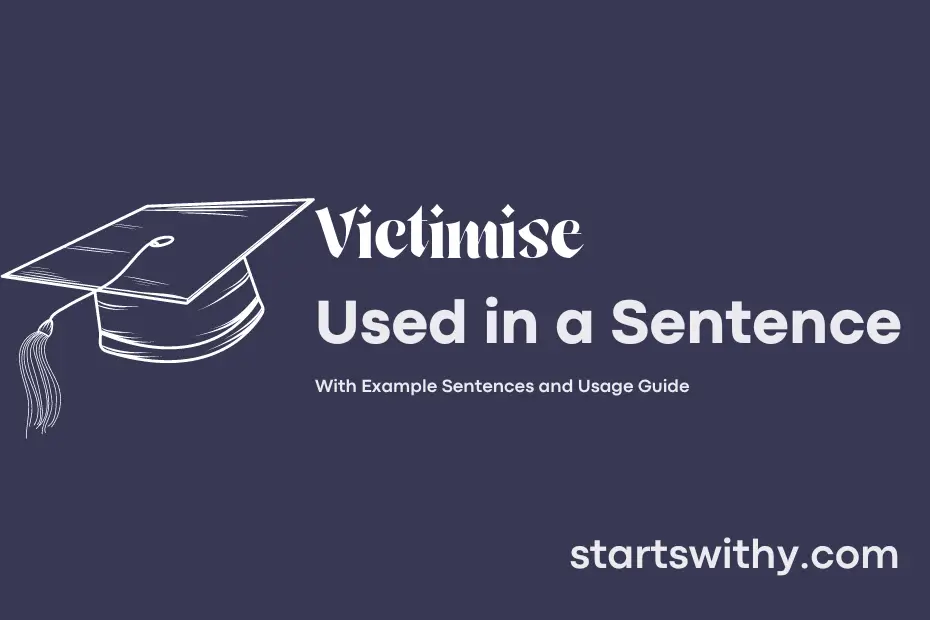Victimise means to harm or exploit someone through cruel or unjust actions. This term is often used to describe situations where individuals or groups are targeted and mistreated, causing them to suffer as a result.
In many cases, victimisation can lead to physical, emotional, or psychological harm, and can have long-lasting effects on the individuals affected. It can occur in various settings such as workplaces, schools, or even within personal relationships.
7 Examples Of Victimise Used In a Sentence For Kids
- Victimise means to make someone feel unhappy.
- We should never victimise others because it is not kind.
- It is important to be a good friend and not victimise anyone.
- Let’s make sure to always treat others with respect and not victimise them.
- If someone tries to victimise you, remember to talk to a grown-up about it.
- We should always stand up for our friends if we see someone trying to victimise them.
- Being nice to others is much better than trying to victimise them.
14 Sentences with Victimise Examples
- Some college students may victimise their classmates by spreading false rumors about them.
- It is important for professors to be aware of any form of victimisation happening among their students.
- Joining study groups can help prevent students from being victimised by others who may try to sabotage their academic success.
- The use of social media platforms can sometimes lead to students being victimised through cyberbullying.
- Peer pressure can often lead students to victimise others in order to fit in with a certain group.
- Mental health awareness campaigns in colleges aim to address issues such as anxiety and depression which can make students more vulnerable to victimisation.
- Gender-based victimisation is a serious issue on college campuses that needs to be addressed through awareness programs and policies.
- A lack of proper communication among students can sometimes lead to misunderstandings and eventually victimisation.
- By creating a culture of respect and inclusivity, colleges can help prevent students from being victimised based on their ethnicity or background.
- Learning conflict resolution skills can empower students to address issues before they escalate into cases of victimisation.
- Student unions play a crucial role in addressing instances of victimisation and ensuring that all students feel safe and supported on campus.
- College counselors offer support to students who have been victimised and help them navigate their emotions and seek justice if necessary.
- Awareness campaigns about the importance of consent can help prevent instances where students may victimise others through sexual harassment.
- Encouraging students to speak up and report instances of victimisation is key to creating a safe and inclusive environment within college campuses.
How To Use Victimise in Sentences?
To use Victimise in a sentence, simply follow these steps:
-
Understand the meaning of the word: Victimise means to treat someone in a way that causes them to feel hurt, upset, or persecuted.
-
Identify a situation where someone is being mistreated or taken advantage of. For example, “The bully continued to victimise the new student by spreading rumors about them.”
-
Place Victimise in your sentence where it fits naturally. Avoid overcomplicating your sentence; keep it simple and straightforward. For instance, “She felt victimised by her unfair treatment at work.”
-
Check to ensure that Victimise is used correctly within the context of your sentence. It should be clear that someone is being unfairly treated or made to feel like a victim.
-
Practice using Victimise in different sentences to become comfortable with incorporating it into your everyday language. This will help you remember how to use the word accurately.
By following these steps, you can effectively incorporate Victimise into your vocabulary and communicate more precisely about situations where someone is being treated unfairly.
Conclusion
In various contexts, such as workplaces, schools, and legal proceedings, sentences with “victimise” highlight the act of unfairly mistreating, harming, or persecuting an individual or group. The word can be seen in statements like “Bullying behavior in the classroom can victimise students and disturb their learning,” emphasizing the negative impact of such actions on those affected. Through these examples, the concept of victimisation is portrayed as a severe and unjust practice that undermines the well-being and rights of individuals, drawing attention to the need for awareness, prevention, and intervention to combat this issue.
By examining sentences with “victimise,” it becomes evident that recognizing and addressing acts of victimisation is crucial for promoting equality, justice, and a safe environment for everyone. Whether in the form of harassment, discrimination, or abuse, the language used to describe victimisation serves as a reminder of the importance of standing up against such behaviors and working towards a more inclusive and empathetic society.



